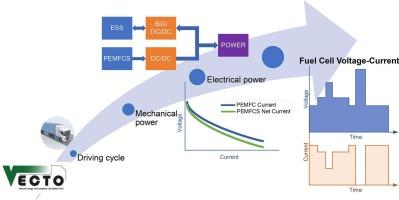Application relevant load cycles for PEMFC component development and hybrid system optimization
IF 10.9
1区 工程技术
Q1 ENERGY & FUELS
引用次数: 0
Abstract
Polymer electrolyte membrane fuel cells (PEMFCs) are one of the key technologies for the decarbonization of transportation. In contrast to light-duty vehicles (LDV), durability requirements for heavy-duty (HD) transport applications are challenging. To overcome these difficulties, material improvements must be complemented by optimized operation strategies. Furthermore, specific testing protocols in application relevant conditions are required. Harmonized testing protocols already exist for automotive applications. However, for HD applications, such protocols are still pending, which represents a bottleneck for further development. A semi-empirical model is used in a novel systematic top-down methodology to generate application related power demand cycles in PEMFC of an HD hybrid vehicle is presented and demonstrated in detail for the case of PEMFC in HD transport. The resulting load profile, applicable at single cell and stack levels, is proposed as a starting point for a harmonization of open-source HD load cycling and testing protocols for PEMFC component development. Furthermore, the method is also used to evaluate the impact of the energy storage system (ESS) capacity and of the hybridization strategy parameters on the PEMFC stack power demand dynamic and efficiency; providing up to 2 % efficiency increase and a 50 % reduction in FC load changes.

应用相关负载周期的PEMFC组件开发和混合系统优化
聚合物电解质膜燃料电池(PEMFCs)是交通运输脱碳的关键技术之一。与轻型车辆(LDV)相比,重型(HD)运输应用的耐久性要求具有挑战性。为了克服这些困难,物质改进必须辅之以优化的操作战略。此外,还需要在应用相关条件下制定具体的检测方案。针对汽车应用的统一测试协议已经存在。然而,对于高清应用来说,这样的协议仍然悬而未决,这是进一步发展的瓶颈。在一种新颖的系统自顶向下的方法中,使用半经验模型来生成HD混合动力汽车中PEMFC的应用相关功率需求周期,并针对HD运输中的PEMFC进行了详细的演示。由此产生的负载概况,适用于单个单元和堆栈级别,被提议作为统一开源HD负载循环和测试协议的起点,用于PEMFC组件开发。此外,该方法还用于评估储能系统(ESS)容量和混合策略参数对PEMFC堆叠功率需求动态和效率的影响;提供高达2%的效率提高和50%的FC负载变化减少。
本文章由计算机程序翻译,如有差异,请以英文原文为准。
求助全文
约1分钟内获得全文
求助全文
来源期刊

Energy Conversion and Management
工程技术-力学
CiteScore
19.00
自引率
11.50%
发文量
1304
审稿时长
17 days
期刊介绍:
The journal Energy Conversion and Management provides a forum for publishing original contributions and comprehensive technical review articles of interdisciplinary and original research on all important energy topics.
The topics considered include energy generation, utilization, conversion, storage, transmission, conservation, management and sustainability. These topics typically involve various types of energy such as mechanical, thermal, nuclear, chemical, electromagnetic, magnetic and electric. These energy types cover all known energy resources, including renewable resources (e.g., solar, bio, hydro, wind, geothermal and ocean energy), fossil fuels and nuclear resources.
 求助内容:
求助内容: 应助结果提醒方式:
应助结果提醒方式:


